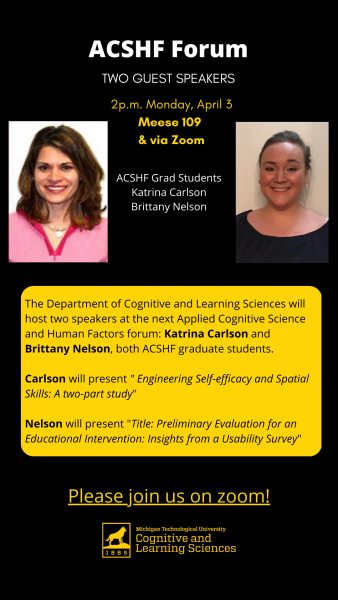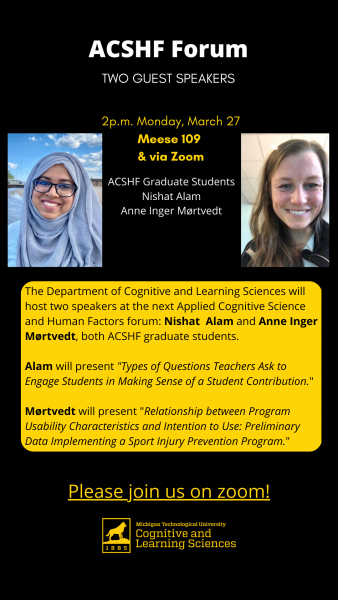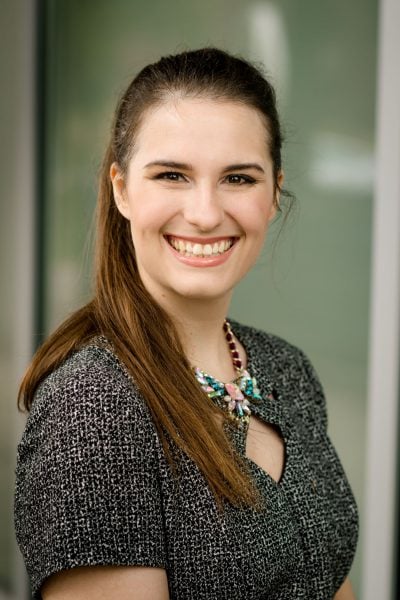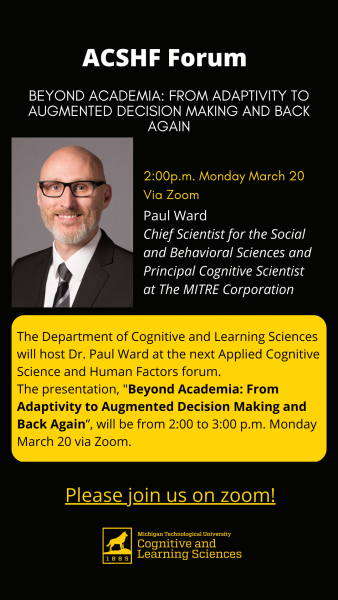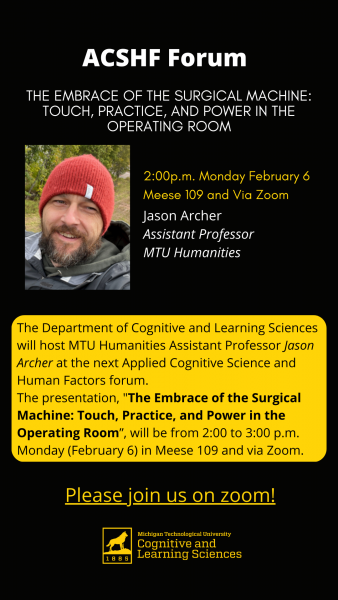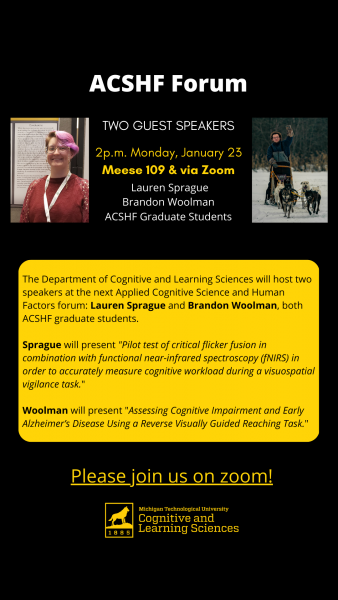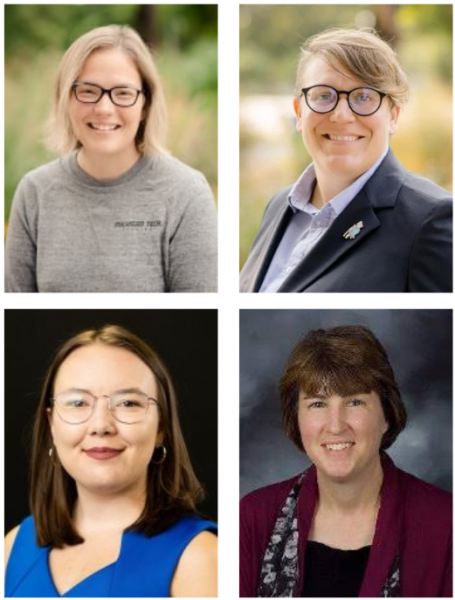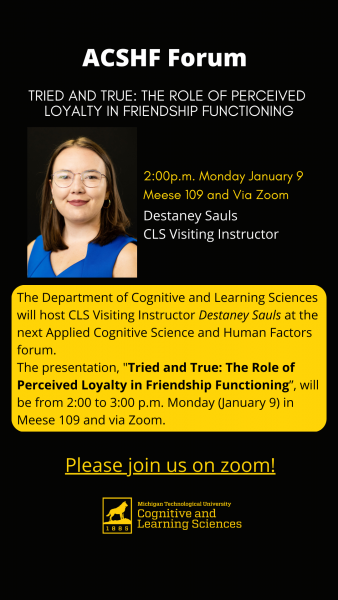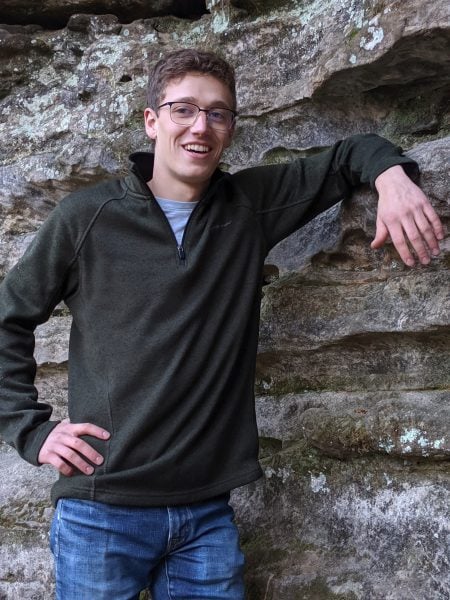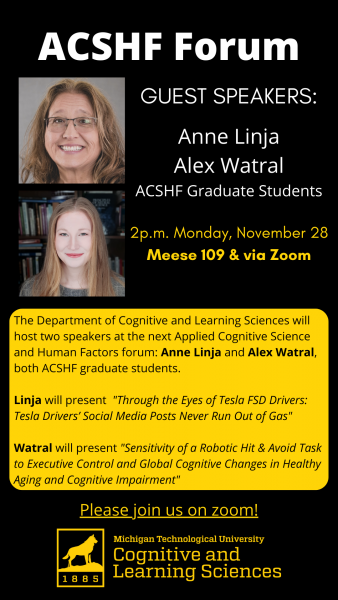The Department of Cognitive and Learning Sciences will host two speakers at the next Applied Cognitive Science and Human Factors forum: Katrina Carlson and Brittany Nelson, both ACSHF graduate students. Their presentations will be from 2:00 to 3:00 p.m. Monday (April 3) in Meese 109 and via Zoom.
Carlson will present ” Engineering Self-efficacy and Spatial Skills: A two-part study”
Abstract:
The research team behind previous work on the increased academic and retention outcomes of students who have taken a Spatial Visualization Intervention course at MTU postulates that affective changes within the students as a result of the course may be responsible for downstream academic success. One possible explanation may be related to the students’ confidence in their ability (self-efficacy) to gain the skills needed to become an engineer. Extensive research has been conducted on self-efficacy, and academic self-efficacy has been shown to be significantly correlated with academic performance.
The first part of this study examines the general and engineering self-efficacy of students at the beginning and end of the Spatial Skills Intervention course, Spring 2023 (N= 9), and compares these to students at the beginning and end of a first year engineering class. One hundred sixty-eight students completed general and engineering self-efficacy surveys. The General Self-Efficacy Scale was used; this tool was developed from longer scales and was found to be a reliable and valid measure of overall self-efficacy and not a specific skill area. The Assessment of Engineering Self-Efficacy V3.0 for undergraduate engineering students was also used. Items on this measure are related to predictions of future academic ability and their sense of belonging in engineering and STEM classes.
The second part of this study will examine students’ visual and spatial perception, memory, and skills through a battery of tasks using the PEBL Platform. Previous research has examined the development of spatial skills and the resulting increase in problem-solving skills across domains that require spatial reasoning. Research has also been conducted to examine whether spatial visualization, the ability to mentally maneuver 2D and 3D objects, is a single ability or is composed of more than one skill or ability. Participants (N=80) will include both Intro to Psychology students, who will also take the Purdue Spatial Visualization Test with Rotations (PSVT:R) as a part of this battery, and first year engineering students.This part of the study will examine the relationships between students’ visual and spatial skills, drawing skills (engineering students only), and their PSVT:R scores and seeks to examine a possible taxonomy of spatial skills. This battery may serve as a reliable and valid assessment in the future of student skills at the high school and/or college level to indicate a need for additional instruction and practice of skills. There may be applications of these findings in other fields and for other purposes, such as geography, computing education, and military use.
Nelson will present “Title: Preliminary Evaluation for an Educational Intervention: Insights from a Usability Survey”
Abstract:
Increasing whole grain intake can reduce the risk of chronic health conditions such as cancer and heart disease. However, people continue to make poor dietary health decisions, and the life expectancy for Americans is declining. Therefore, a novel intervention is needed to boost informed dietary decision-making. This study aimed to (1) provide preliminary evidence on the effectiveness, enjoyment, and efficiency of a novel intervention and (2) identify practices for making scientific information more usable. The study used a self-report online survey. Qualitative and quantitative data were collected to test the effectiveness, enjoyment, and efficiency of the educational intervention and how to improve it. Results suggest that the intervention is effective at increasing informed preventative decision-making. One hundred percent of participants showed adequate gist understanding across the four knowledge domains: habit gist understanding, whole-grain gist understanding, gist understanding of benefits, and gist understanding of susceptibility and severity. The results also revealed several strategies for increasing the usability of other educational interventions for a student sample demographic: increase/incorporate graphs, data, and references to increase the trustworthiness of an intervention. These results suggest that an educational video intervention effectively increases informed decision-making for preventative behaviors. These findings are also valuable for future intervention development and testing, making this proposal the next step for preventative care.
